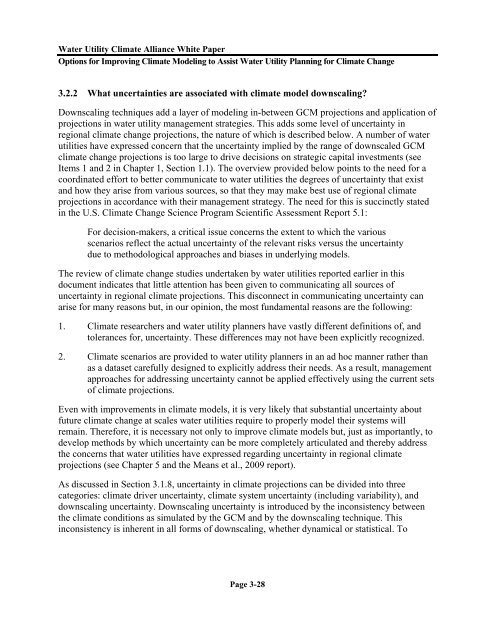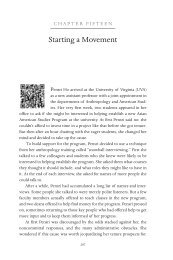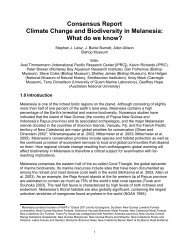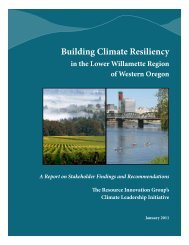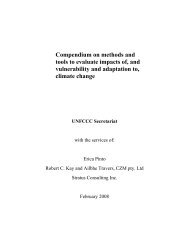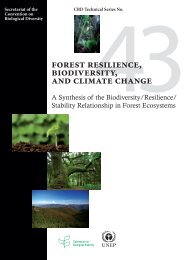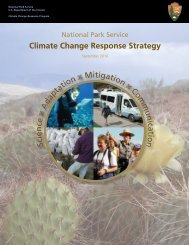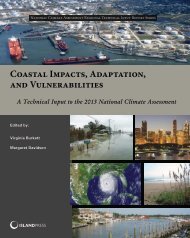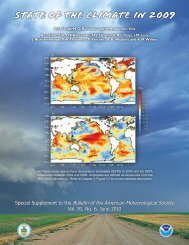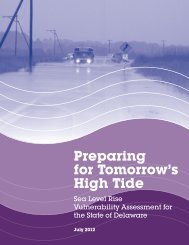Options for Improving Climate Modeling to Assist Water Utility ...
Options for Improving Climate Modeling to Assist Water Utility ...
Options for Improving Climate Modeling to Assist Water Utility ...
You also want an ePaper? Increase the reach of your titles
YUMPU automatically turns print PDFs into web optimized ePapers that Google loves.
<strong>Water</strong> <strong>Utility</strong> <strong>Climate</strong> Alliance White Paper<br />
<strong>Options</strong> <strong>for</strong> <strong>Improving</strong> <strong>Climate</strong> <strong>Modeling</strong> <strong>to</strong> <strong>Assist</strong> <strong>Water</strong> <strong>Utility</strong> Planning <strong>for</strong> <strong>Climate</strong> Change<br />
3.2.2 What uncertainties are associated with climate model downscaling?<br />
Downscaling techniques add a layer of modeling in-between GCM projections and application of<br />
projections in water utility management strategies. This adds some level of uncertainty in<br />
regional climate change projections, the nature of which is described below. A number of water<br />
utilities have expressed concern that the uncertainty implied by the range of downscaled GCM<br />
climate change projections is <strong>to</strong>o large <strong>to</strong> drive decisions on strategic capital investments (see<br />
Items 1 and 2 in Chapter 1, Section 1.1). The overview provided below points <strong>to</strong> the need <strong>for</strong> a<br />
coordinated ef<strong>for</strong>t <strong>to</strong> better communicate <strong>to</strong> water utilities the degrees of uncertainty that exist<br />
and how they arise from various sources, so that they may make best use of regional climate<br />
projections in accordance with their management strategy. The need <strong>for</strong> this is succinctly stated<br />
in the U.S. <strong>Climate</strong> Change Science Program Scientific Assessment Report 5.1:<br />
For decision-makers, a critical issue concerns the extent <strong>to</strong> which the various<br />
scenarios reflect the actual uncertainty of the relevant risks versus the uncertainty<br />
due <strong>to</strong> methodological approaches and biases in underlying models.<br />
The review of climate change studies undertaken by water utilities reported earlier in this<br />
document indicates that little attention has been given <strong>to</strong> communicating all sources of<br />
uncertainty in regional climate projections. This disconnect in communicating uncertainty can<br />
arise <strong>for</strong> many reasons but, in our opinion, the most fundamental reasons are the following:<br />
1. <strong>Climate</strong> researchers and water utility planners have vastly different definitions of, and<br />
<strong>to</strong>lerances <strong>for</strong>, uncertainty. These differences may not have been explicitly recognized.<br />
2. <strong>Climate</strong> scenarios are provided <strong>to</strong> water utility planners in an ad hoc manner rather than<br />
as a dataset carefully designed <strong>to</strong> explicitly address their needs. As a result, management<br />
approaches <strong>for</strong> addressing uncertainty cannot be applied effectively using the current sets<br />
of climate projections.<br />
Even with improvements in climate models, it is very likely that substantial uncertainty about<br />
future climate change at scales water utilities require <strong>to</strong> properly model their systems will<br />
remain. There<strong>for</strong>e, it is necessary not only <strong>to</strong> improve climate models but, just as importantly, <strong>to</strong><br />
develop methods by which uncertainty can be more completely articulated and thereby address<br />
the concerns that water utilities have expressed regarding uncertainty in regional climate<br />
projections (see Chapter 5 and the Means et al., 2009 report).<br />
As discussed in Section 3.1.8, uncertainty in climate projections can be divided in<strong>to</strong> three<br />
categories: climate driver uncertainty, climate system uncertainty (including variability), and<br />
downscaling uncertainty. Downscaling uncertainty is introduced by the inconsistency between<br />
the climate conditions as simulated by the GCM and by the downscaling technique. This<br />
inconsistency is inherent in all <strong>for</strong>ms of downscaling, whether dynamical or statistical. To<br />
Page 3-28


